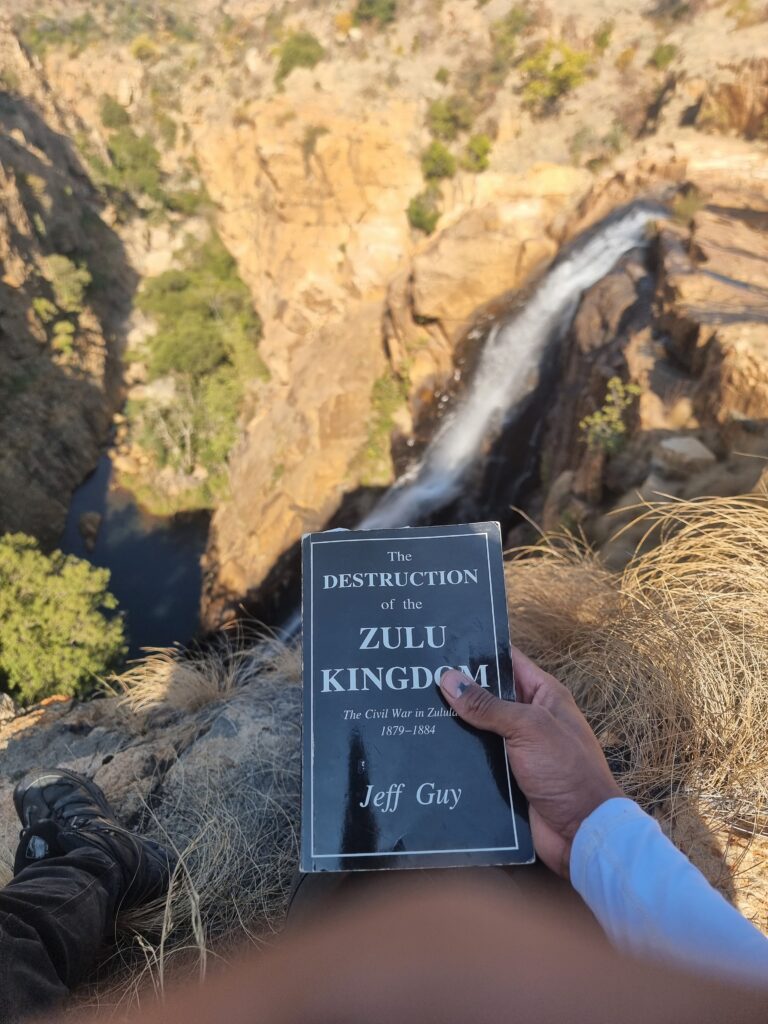
Exploring Zululand: Reflections on “Destruction of the Zulu Kingdom” by Jeff Guy
As a South African traveler keen on uncovering the layers of our nation’s history, my journey through Zululand has been both eye-opening and deeply enriching. Recently, I delved into Jeff Guy’s “Destruction of the Zulu Kingdom,” a powerful account of the turbulent period between 1879 and 1884. This book shed new light on the events that followed the Anglo-Zulu War, a pivotal chapter in our history that I thought I understood well—until now.
Guy’s book takes us through the aftermath of the Zulu Kingdom’s defeat by the British, highlighting the capture of King Cetshwayo and the systematic dismantling of Zulu society by British colonial forces. This was a time when the once-unified Zulu Kingdom, known for its strong social structure and military prowess, was forcibly fractured into 13 separate chiefdoms by Sir Garnet Wolseley, the British High Commissioner. The intent was clear: to break the Zulu power structure and prevent any resurgence of resistance.
One of the most significant insights I gained from this book is the role the British played in orchestrating internal conflict within Zululand. By installing rival chiefs like Zibhebhu and Hamu, they effectively sowed the seeds of civil war, leading to bloody conflicts between factions such as the Usuthu, who remained loyal to the royal house, and the Mandlakazi, who supported the British-backed chiefs. These internal struggles, often seen as mere infighting, were in fact deliberate strategies by the British to weaken the Zulu resistance from within.
As someone who has read John Laband’s account of the Boer invasion of the Zulu Kingdom, I was familiar with the external pressures facing the Zulu people. However, Guy’s detailed exploration of the internal strife brought about by British manipulation expanded my understanding of how deeply these colonial forces impacted Zulu society. The British weren’t just interested in defeating the Zulu Kingdom on the battlefield; they aimed to dismantle it entirely, changing the very fabric of its society to ensure that it could never again pose a threat to their colonial ambitions.
Traveling through the battlefields and royal sites of Zululand with this knowledge in mind, I couldn’t help but feel a profound sense of loss for what was taken from the Zulu people. The Zulu Kingdom was more than just a political entity; it was a sophisticated social system that, through strategic and calculated colonial interference, was brought to its knees.
This book is a crucial read for anyone interested in understanding not just the events of the Anglo-Zulu War, but the far-reaching consequences of British colonial policies in South Africa. It adds a layer of depth to the narrative, illustrating how the British empire expanded its influence not just through conquest, but through the calculated destruction of Zululand’s existing social formations. After reading books like these, it becomes more and more clear how European imperialism or colonial forces successfully destroyed and took away the power and wealth of the existing South African kingdoms.
In conclusion, Jeff Guy’s “Destruction of the Zulu Kingdom” offers invaluable insights into a period of history that is often glossed over in broader discussions about the Anglo-Zulu War. For South Africans like myself, it’s a stark reminder of how our history has been shaped by forces that sought to divide and conquer, and how the scars of that period are still visible in the landscapes and communities of Zululand today. As I continue to explore this region, I carry with me a deeper appreciation for the resilience of the Zulu people and the importance of preserving and understanding our shared history. The more and more i learn about history, the more I see that it was not as simple as we were taught in school but a much deep story about intense competition and cooperation amongst many different groups and for many different reasons.
Unfortunately this book was out of print, and I was lucky enough to find it at a local book store that I will reserve the name for now. Because I am getting such great titles from them. I know its very selfish of me, but it took me a very long time to find a place that has such a variety of great books that are no longer in print.